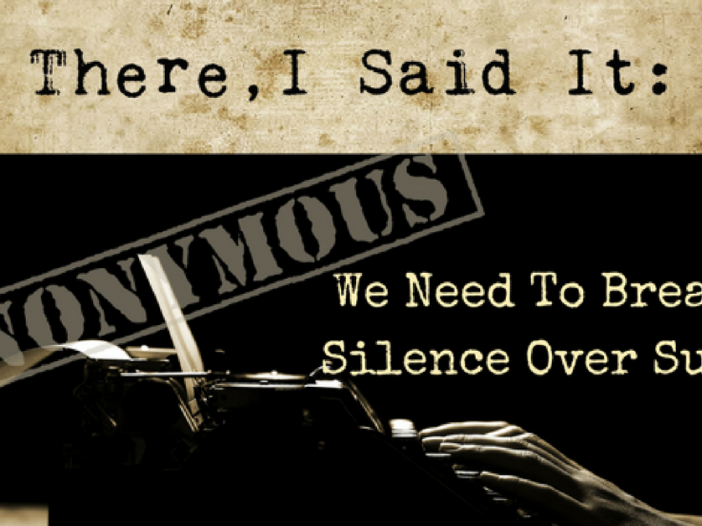
We skirt the cage this tiger circles in. We’ve been taught over decades to walk carefully around this topic and its people like they are in the middle of a mandala and the path is eggshells. I remember being told if we talked about it, then people would do it. We’d best just keep quiet.
It triggered me even then. If someone is asking you to keep a secret and it’s not about something fun, something is wrong. Alarm bells should be going off. Why don’t you want to talk about this? What makes you so uncomfortable? I suspect that it’s not having all the answers. I suspect it’s being afraid of saying the wrong things. I suspect it’s feeling responsible. I suspect it’s helplessness and a lack of understanding. I remember thinking, “Why don’t they want to talk about me?”
What can you do?
You can educate yourself about suicide, about symptoms and signs. You can have open, non-judgmental conversations with your colleagues and your co-workers about suicide. You can speak up against the pervasive suicide shaming and misinformation in our culture.
There are plenty of myths that are still pervasive in culture in general about suicide and suicidality. Let’s debunk them here, not for the first time, and not for the last, but as a solid reminder:
Myth: People who try to kill themselves are mentally ill.
Fact: Mental health, well-being, and balance are topics that are just now being brought to the forefront of conversations about suicide in the veterinary profession. While mental illness may predispose an individual to suicidal thoughts, many suicidal individuals are not struggling with mental illness. They may instead be suffering from extreme distress and emotional pain, which are not necessarily signs of mental illness. The stigma surrounding mental health crisis, suicidality, and depression prevents these individuals from speaking out as openly as we need them to and they need to get help.
Myth: People who talk about suicide don’t do it.
Fact: Most everyone who attempts suicide has given verbal clues. No matter how casually offhand comments are made, they should be taken seriously.
Myth: If a person has made a plan to kill themselves, nothing is going to stop them.
Fact: Suicide isn’t about dying. It’s about stopping pain. The impulse to end it all, however overpowering, does not last forever.
Myth: Talking about suicide may give someone the idea.
Fact: You don’t give a suicidal person ideas by talking about suicide. Removing the stigma surrounding the subject of suicide and discussing it openly is one of the most helpful things you can do.
Here are a few things I’d like you to know about suicide:
- We work in your clinics. We are your top performers. We work in industry. We are world-renowned speakers. You don’t just act shocked when we take our lives, you are shocked because you didn’t notice.
- We have gotten help and yes if we were prescribed medication we are probably taking it. This issue isn’t about getting into counseling or getting onto the right drug regimen. Those things help, but it’s deeper. Studies of suicide victims have shown that more than half had sought medical help in the six months prior to their deaths.
- Suicide isn’t selfish, but it also isn’t about you.
- Suicide isn’t cowardly either. It’s literally a choice someone made and it’s not your place to judge.
- Committing to suicide is not a brief process, it takes time, thought, research, and a great deal of soul searching. Suicide is for so many people the choice they are making to escape unbearable pain.
- There are warning signs. If you see us exhibiting these behaviors, reach out. Please let us know that you are concerned about us and why. Ask how you can help.
- Don’t know what to say, that’s okay. Dial the crisis line number and sit next to them while they talk.
- Don’t minimize how this feels for us. It’s totally okay to say, “I don’t have any idea what you’re going through” or to ask, “how does this feel” and “what does tomorrow look like?” But telling us “we have so much to live for” isn’t the right tact.
- We aren’t contagious. When one of us speaks up, it is a bright light in a dark place and it allows for others to speak up. While we’ve made tremendous roads regarding mental health in veterinary medicine, it’s time that the stigma surrounding suicide fall aside.
- Suicidality doesn’t have to define who we are and it absolutely does not have to define who we were.
National Suicide Prevention Lifeline – Suicide prevention telephone hotline funded by the U.S. government. Provides free, 24-hour assistance. 1-800-273-TALK (8255).
Crisis Text Hotline – Text HOME to 741741 from anywhere in the USA, anytime, about any type of crisis.
The views and opinions featured on There, I Said It are those of the authors and do not necessarily reflect the position of the DrAndyRoark.com editorial team.